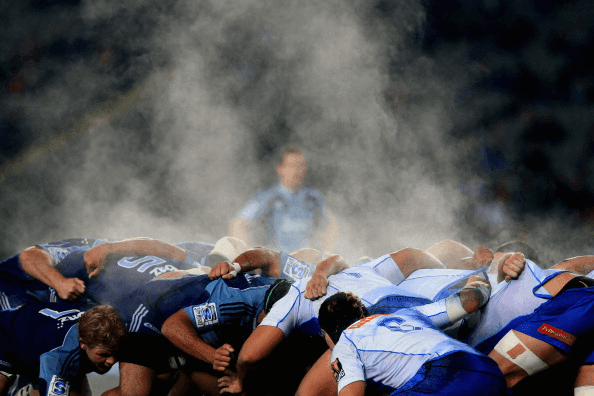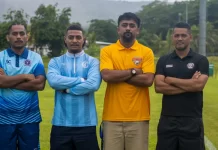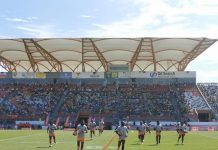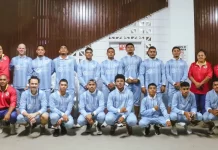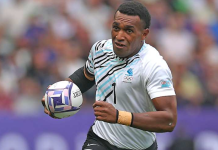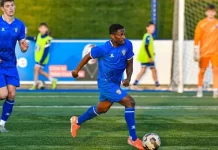Australian and New Zealand rugby officials are mulling a rule change to allow Super Rugby games to start with uncontested scrums in the event of a Covid-19 outbreak this season.
As the Queensland Reds reel from a viral cluster that has felled five of their biggest names just 10 days out from the start of the season, competition administrators are working through the implications of widespread outbreaks.
A common pool of 30 club players has been created over and above each Super Rugby’s team’s extended squad to help plug any holes that may emerge due to the virus, with a heavy flavour of props and halfbacks to cover the code’s specialist positions.
Safety considerations mean props will undergo extra training and monitoring to make sure they are up to Super Rugby standard, but officials may also ask World Rugby to allow games to start with uncontested scrums in the event a team cannot field enough props to contest the set piece.
“It’s a tricky one, tighthead props of high quality don’t grow on trees. If you lose a couple to Covid, rugby’s a different game to the Big Bash, where you can bring in club players,” Brumbies coach Dan McKellar said.
“Hopefully we manage to avoid any sort of setbacks there and the competition as a whole manages to avoid those situations. You don’t want to be exposing players that aren’t ready to play at a professional level.
“It is pretty tough to go from the Tuggeranong Vikings to playing against the Crusaders as a front-rower. So, we have a pool of players there. You need a bit of luck to make sure we are not taking high risks.”
Under current World Rugby regulations, a game cannot start with uncontested scrums. Faced, however, with the implications of forfeiting games in the event a side cannot draft in a prop of a sufficient standard, RA officials are looking at the merits of asking the governing body for a temporary exemption to that rule for Super Rugby Pacific.
The latest iteration of Super Rugby was launched virtually on Monday in Australia with the unveiling of competition naming rights sponsor Harvey Norman headlining the event.
The 12-team tournament featuring five Australian sides, five New Zealand sides, the Fijian Drua and Moana Pasifika, starts on February 18 but the contagious omicron variant is promising to cause the same headaches in the winter codes as it has in the summer codes.
In New Zealand, where the definition of a “close contact” is much broader than in Australia, the stakes are even higher. Their six teams will play the opening rounds of the competition in a bubble in Queenstown to ensure a Covid-19 outbreak does not take out whole squads at a time.
In Australia, Reds stars James O’Connor, Hunter Paisami, Tate McDermott, Jordan Petaia and Jock Campbell are in isolation after contracting the virus, as well as coach Brad Thorn and the team’s media chief Tom Mitchell.
The Western Force are traversing the eastern seaboard to fulfil their commitments, praying for state government approval to fly in and out of Perth for a home game against the Reds in round three. The Drua, under pressure to be competitive in their history-making debut season, have had badly needed trial games thwarted by border restrictions and are surely realising their two scheduled home games are looking more like pipe dreams.
When teams from both sides of the Tasman converge in Melbourne for Super Round at the end of April, there is a fair to moderate chance the Kiwis will not leave again until the competition is over.
“[We are] obviously concerned,” Marinos said. “We’ve done everything, New Zealand has said they’ve done everything to try to mitigate that risk as far as possible, so now we’ve got to really roll with the punches week by week. Hopefully, by the time we need to do the crossover, the trans-Tasman borders are open and it’s a little bit more under control in both Australia and New Zealand for that purpose.”
Both NZ and Australian officials agree the top priority is getting the competition away, by whatever means necessary. Marinos said short quarantine periods upon arrival in New Zealand were not off the table, and nor was moving the back half of the competition to Australia.
A decision will need to be made by the end of next month, at the latest, with the deciding factor resting in the hands of the New Zealand government. There are hopes that a revision of the waiting time required between the second Covid-19 vaccination dose and the booster shot could be the key to opening up.
“We want to give ourselves a reasonable lead time coming into [Super Round] but also at the same time give New Zealand as much time as possible because things do change quite dramatically,” Marinos said.
“What we do know is we can bring the Kiwi teams over if we need to over in Australia and they can base themselves here for a period if that’s required. But that’s all high-level contingency, because we would really like to make sure we can play some of those games in New Zealand as well.”
SOURCE: SMH/ PACNEWS






